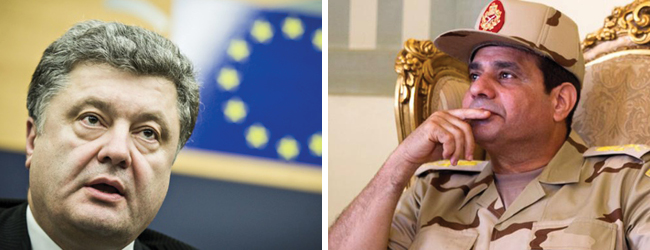

Ukrainian President-elect Petro Poroshenko and Egyptian President-elect Abdel Fattah el-Sisi
President-elect Petro Poroshenko received swift congratulations from President Obama for his apparent outright victory In Ukraine — including in many Russian-speaking parts of the country. In Egypt, the response was more muted for the apparently overwhelming election of former-Field Marshall Abdel Fattah el-Sisi. This after a heat wave and local reports of conspicuously low voter turnout led the Egyptian election commission to extend voting an additional day.
In Ukraine, the International Republican Institute (IRI) and National Democratic Institute for International Affairs (NDI) were on the ground as election monitors, accompanied by Senators Kelly Ayotte, Rob Portman, and Ben Cardin, as well as former-Secretary of State Madeleine Albright, among others. They released a preliminary verdict of free and fair elections in all but two eastern districts, with Poroshenko winning 55% of a turnout of nearly 60% of Ukrainians.
In Egypt, Al-Sisi reportedly received a startling 93% of the vote with turnout at around 40% over the three days, but NDI and IRI were not able to monitor the elections after members of their local staff were detained in early 2012. A European Union election monitoring effort were unable to secure permission to bring equipment into the country. Democracy International, which was on the ground, described the political context for the election as “hugely troubling.”
Implications for the United States? We should start by noting that, before the elections, both countries lacked internationally recognized heads of state after President Yanukovych fled Ukraine in February and President Morsi was overthrown in Egypt last August.
Poroshenko now faces the daunting task of an economy in shambles and balancing expectations from East and West, but he’s already reassured Ukrainians that he’s up for the task, saying he knows Putin well and will meet President Obama next week in Europe.
As for President-elect Sisi, Marc Sievers, the U.S. chargé d’affaires to Egypt, recently said simply: “The U.S. will work with Egypt’s democratically elected president, whichever of the candidates wins the election.”
In some ways, the question of U.S. foreign assistance frames the challenge in both countries. The United States already approved an aid package for Ukraine, and policymakers have praised the election results. As for Egypt, the United States recently partially resumed its military aid, although senior lawmakers have said they will block further assistance. Observers suggest that foreign assistance is likely to continue, given U.S. interests in the Middle East and the desire for a channel for influence.
The tale of two elections shows that the United States cannot impose democracy around the world, but it can help when countries seek freer and more accountable governments for themselves.
A few concluding points for those follow the democracy debate: elections obviously do not equal democracy. Authoritarian regimes have regularly staged elections with high voter participation and overwhelming support, which were not democratic because they were not free and fair. Being elected democratically is also no guarantee that the victors will govern democratically, as too many elected leaders have fallen prey to authoritarian temptations. But elections are an indispensable part of governing accountably – we might say a necessary, but not sufficient condition for democracy – and their results shape the political landscape in these countries where the United States has interests.